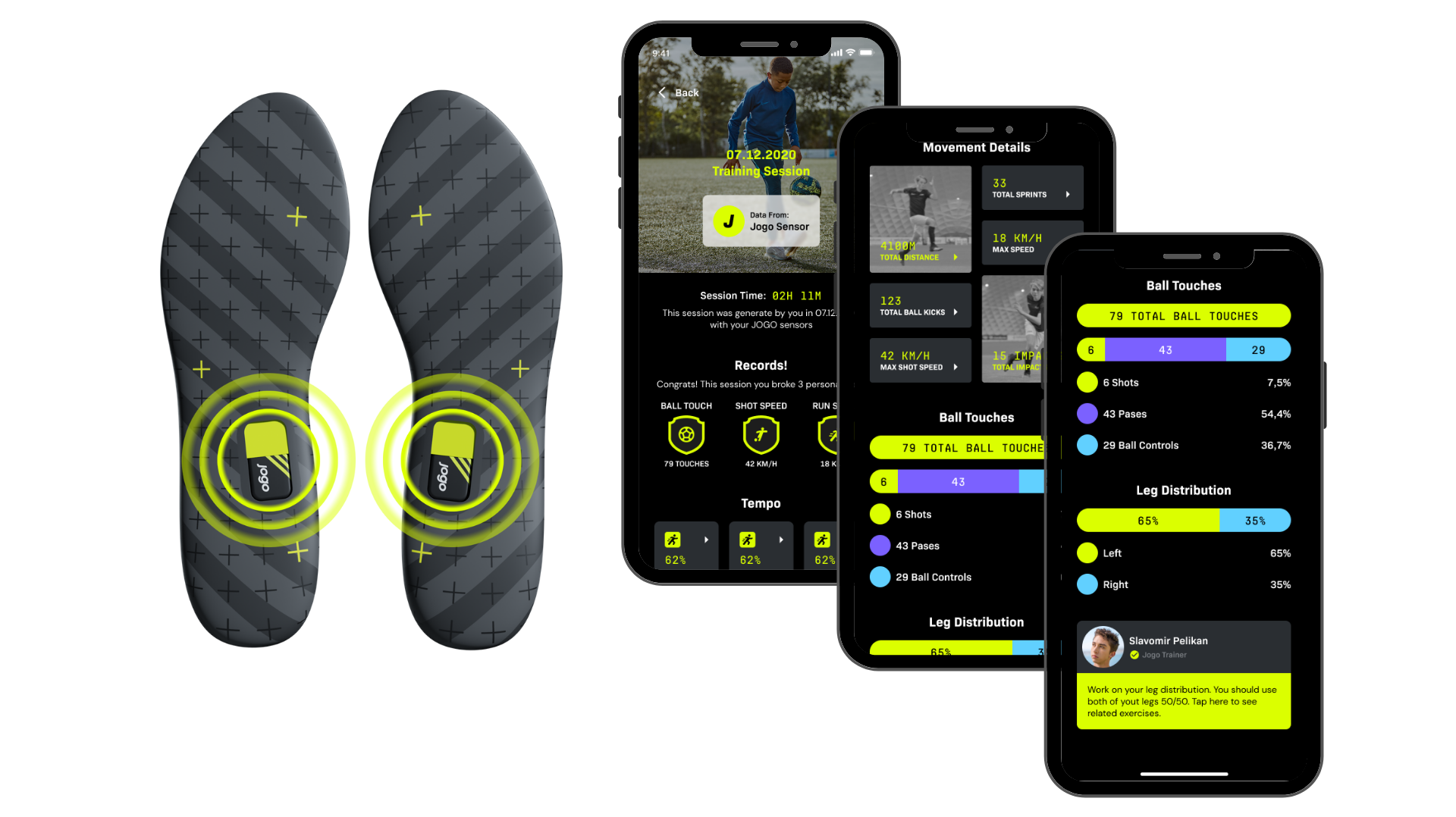AZoSensors speaks with Laura Du Ry from JOGO. JOGO's state-of-the-art data collection - driven by AI, machine vision and learning, as well as sensor tech makes it possible to track physique, technique and cognitive abilities. Clubs and trainers can follow the progress of their players, while players can measure their own growth - all in real-time.
How did you first become interested in footballer monitoring technology?
During my career, we used GPS and heart monitoring during training sessions and games, so my first introduction was as a player. I enjoyed knowing my “stats” after a game. Having insights into my performance helped me validate my own feeling about how I played or at least helped validate that I put in the work, or not.
Does your experience as a player give you any special insight in this area?
Definitely! One thing I really like about JOGO is that a player’s data is their own, they can access it whenever they want on their phone, that is something I missed as a player. We always had to go to the performance analyst to ask for the data, and then still, you only just got a number with little comparison to previous efforts. I think my experience has really helped me understand the importance of being able to consume your own data in a visual and understandable way. That is the only way to actually learn from past performance.
Can you describe how you’ve seen this technology develop since you played for ADO Den Haag in 2010/11?
When I started playing, the data used at that time was merely statistics or video analysis. Statistics being minutes played, clean sheets, goals scored/conceived etc, which to me is just an end state, an output. The video did give more dimension to this, however “good” or “bad” was still determined by a coach, and so still very subjective and sensitive to bias.
What I have seen change, and is changing more and more, is that subjective data is making room for objective data, of which GPS and heart monitoring are the first to arise. With GPS you can establish a hard number which is also an input number, and thus less sensitive to bias. If the benchmark in the team is 10 km a game, a “good” or “bad” evaluation can be based on factual data, not opinions. The same goes for heart monitoring, although this technology is often still unstable. But as I mentioned, the shift from subjective to objective data is the main change.

How did you become involved with JOGO?
I reached out to David, Founder & CEO of JOGO, when I worked for a company that helped start ups with numerous services. A colleague of mine noticed JOGO and told me, considering my background, about the company. I reached out straight away, and met with David to talk about JOGO, since that day I fell in love with his vision and the rest is history.
Can you explain what JOGO’s primary mission statement is?
To make talent development data technology-driven, insightful and accessible, by creating and designing next level technology. We believe in making football data-driven and tech-savvy for everyone, not just the professionals, giving every player the opportunity to reach their full potential.
Are there any particular JOGO products that you are particularly excited about?
Yes! I am really excited about our new JOGO insole Sensors, this is something that I would have loved to have had as a player. Coming back to my previous point of seeing your own performance data; this is exactly what JOGO sensors will do. You can track how fast you are, distance covered, ball touches, even leg distribution, shot power and more. It’s like playing FIFA in real life, so even if you don’t aspire to be the next Lieke Martens, you can still have great fun knowing your stats or your friends. So, we are excited to go live on Kickstarter soon!
What level of club are JOGO sensors recommended for?
All levels! That is what makes us different. We believe football is for everyone, and everyone should have the possibility to play with technology and data. If we only make it for the higher end market or professionals the gap between “big” clubs and the little ones will only get bigger and to me, that is not what football is about. So to give you an idea, our app with video analytics is free for all players, and our sensors will always be at an accessible price.
Who are some of the largest clubs that JOGO are currently collaborating with?
Valencia CF (Spain) , SC Cambuur (Dutch Champion second division), OHL Leuven (Belgium), FC Basel (Switzerland), Dalian Pro (China), and we also partner with tournaments, Gothia Cup (Sweden) being one of them. In addition, we are a part of FIFA’s partner development program, and we are working with the Philipines federation.
How can monitoring technology help managers make informed decisions about tactics during a game?
Depending on the technology, you can make many informed decisions. Heart monitoring can show a player is constantly in ‘red’, meaning they are not recuperating fast enough, it is best to sub such a player for a fresh one. Other data like workload or distance covered can show a player is not putting in the work they should and this could lead to a substitution or change in formation. In addition, where a player covers most distance, with or without the ball, can show where your team's strengths are.
What role could monitoring technology play in protecting and encouraging player health?
A big one if you ask me. Combining monitoring data with sports science is a big win for the sports industry. If you have a benchmark set and a player is below or above this, you can make informed decisions. Also, you can track a player’s fatigue during a game, either by heart monitoring, ground force reaction, or intensity drop. When such signals are acted on, players can prevent injuries, which is an obvious win.
Do you foresee a time when all players will be equipped with sensors during training and matches?
I do; I always envision that when you go to buy your kit, a pair of sensors is part of that kit; shirt, shorts, socks, shinpads, sensors, shoes, (and in my case, gloves). I am a firm believer in technology and data, we use them in our everyday life, so why not in football?
How could this change the game of football as a whole?
If technology becomes accessible to everyone, everywhere, then it can change the game as a whole, if not then it will only make waves in a part of football, only making it less inclusive. That said, technology is already changing the game, how we scout, how players make decisions on their transfers, adding sensor technology into all levels of football will only enhance this change. My hope is that sensor technology will make football fairer, giving players more opportunities no matter their circumstances.
Where can readers find more information?
Our website: https://jogo.ai/
Our Kickstarter campaign: https://www.kickstarter.com/projects/jogoai/jogo-data-driven-talent-development
Our general presentation: https://docsend.com/view/kced3cf7dnj38j29
Our press release sensors: https://www.jogo.ai/
About Laura Du Ry
 For 8 wonderful years, I had the pleasure of being a footballer on the highest level. My highlights being playing Champions League in 2011 with Standard Luik, 4 years of my favorite club AFC AJAX, playing the Euro champions with U19, being part of the Dutch National team.
For 8 wonderful years, I had the pleasure of being a footballer on the highest level. My highlights being playing Champions League in 2011 with Standard Luik, 4 years of my favorite club AFC AJAX, playing the Euro champions with U19, being part of the Dutch National team.
Now I work for JOGO as Head of Marketing, leading all communications and making the world fall in love with JOGO. Prior experience has been working in sales and marketing for a fintech company, and a company supporting the European tech start up scene with its services. So for me, the combination of tech, start up and football is a dream come true.
Interview questions provided by Robert Lea.
Disclaimer: The views expressed here are those of the interviewee and do not necessarily represent the views of AZoM.com Limited (T/A) AZoNetwork, the owner and operator of this website. This disclaimer forms part of the Terms and Conditions of use of this website.